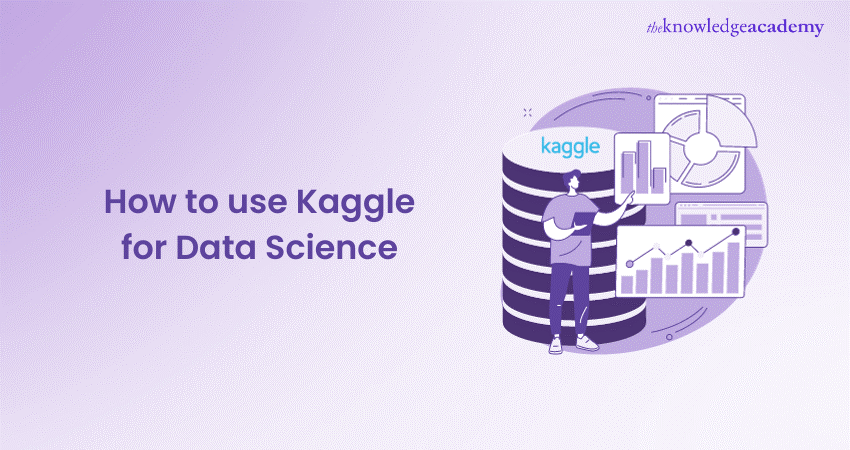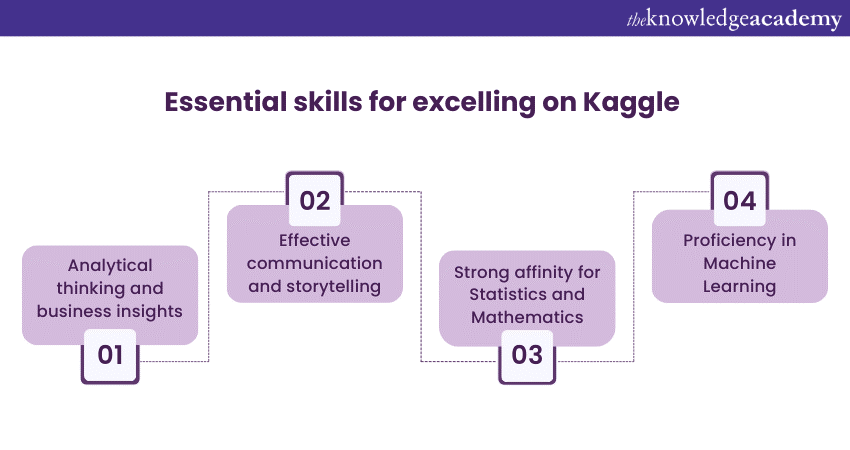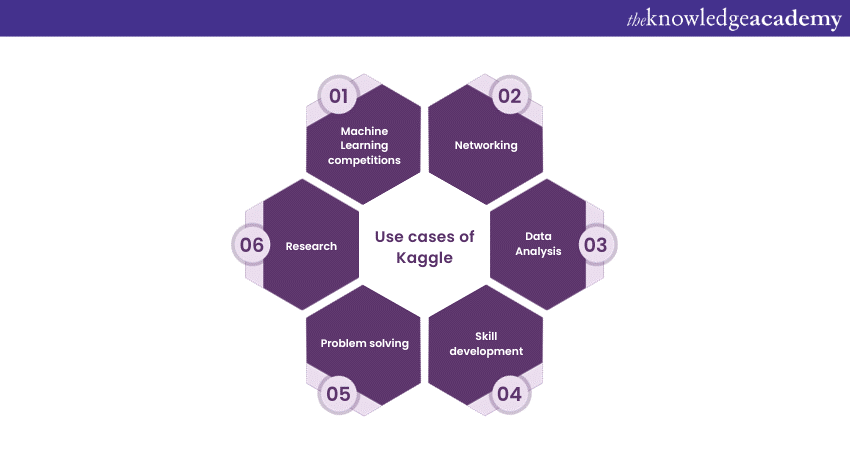We may not have the course you’re looking for. If you enquire or give us a call on 01344203999 and speak to our training experts, we may still be able to help with your training requirements.
Training Outcomes Within Your Budget!
We ensure quality, budget-alignment, and timely delivery by our expert instructors.

The Internet has many learning platforms. Some start from the basics and teach a lot, and Kaggle is one of them. Kaggle is a great place for people who love Data Science, Machine Learning, and Big Data. Its growth over the past few years in terms of use and popularity has prompted many people to ask: “How to Use Kaggle for Data Science?”
In this blog, we will discuss what Kaggle is, its advantages, How to use Kaggle for Data Science, the skills required, etc. Read more for a better understanding!
Table of Contents
1) What is Kaggle?
2) Advantages of Kaggle
3) How to use Kaggle for Data Science?
4) Essential skills for excelling on Kaggle
5) Conclusion
What is Kaggle?
Kaggle is an online platform that brings together Data Scientists, Machine Learning practitioners, and Statisticians from around the world. It was founded in 2010 and is now owned by Google. Kaggle offers a wide range of tools and resources to help data enthusiasts practice and improve their skills.
Advantages of Kaggle
Kaggle offers numerous advantages for data enthusiasts and professionals in the field of Data Science. Here are some key benefits of using Kaggle:
a) Access to diverse datasets: Kaggle provides a vast repository of datasets covering various domains, from healthcare to finance. This access to diverse data allows data scientists to work on real-world problems and gain practical experience.
b) Participation in competitions: Kaggle hosts a wide range of Data Science competitions, some with substantial cash prizes. These competitions allow participants to apply their skills to solve challenging problems, learn from their peers, and even earn recognition in the field.
c) Kaggle kernels: Kaggle Kernels offer a cloud-based environment for running code. They make it easy to experiment with data, build models, and share your work with the Kaggle community. This tool is invaluable for collaborative projects and quick data analysis.
d) Learning resources: Kaggle provides free, high-quality courses on Data Science, Machine Learning, and artificial intelligence. These courses are suitable for beginners and advanced learners, helping individuals acquire new skills and advance their careers.
e) Community collaboration: Kaggle has a thriving community of data scientists and enthusiasts. Users can discuss projects, seek advice, and learn from others. Collaboration is encouraged, making Kaggle a supportive environment for skill development.
f) Data visualisation tools: Data visualisation is a crucial part of data analysis and communication. Kaggle offers tools and resources for creating insightful visualisations, helping data scientists effectively convey their findings.
g) Career advancement: Kaggle experience is highly regarded by employers in the Data Science industry. Listing Kaggle’s achievements on your resume can help you stand out and advance your career. It showcases your practical skills and problem-solving abilities.
h) Progress tracking: Kaggle tracks your progress and achievements, providing motivation and a sense of accomplishment as you complete challenges and improve your skills.
i) Open-source contributions: Kaggle's datasets and code are often open-source. By contributing to Kaggle, you can give back to the Data Science community and help others learn and grow.
j) Networking opportunities: Engaging with Kaggle can lead to networking opportunities within the Data Science field. You can connect with professionals, mentors, and potential collaborators.
How to use Kaggle for Data Science?
Kaggle has established itself as a pivotal resource for data enthusiasts. Whether you're a novice or an experienced data scientist, here's a step-by-step guide on effectively utilising Kaggle for your Data Science journey:
a) Create a Kaggle account: To get started, you need to sign up for a Kaggle account. You can do this using your email or Google account.
b) Navigate Kaggle's interface: Familiarise yourself with Kaggle's user-friendly interface. This includes exploring the homepage, datasets, competitions, and learning resources.
c) Explore Kaggle datasets: Begin by browsing Kaggle's extensive dataset collection. Use filters and search features to find datasets aligned with your interests and projects.
d) Participate in Kaggle competitions: Select a competition that matches your skill level and interests. Consider forming or joining a team to tackle challenges collaboratively. Compete to solve real-world problems and potentially earn prizes.
e) Leverage Kaggle Kernels: Create Kaggle Kernels to work on data projects. Utilise these cloud-based computational environments for coding and data analysis.
f) Engage with Kaggle courses: Choose from Kaggle's wide range of courses to enhance your Data Science skills. Start with introductory courses if you're a beginner, and progress to more advanced topics like deep learning.
g) Collaborate with the Kaggle community: Join discussions, forums, and threads on Kaggle. Seek advice, share your knowledge, and collaborate on data projects with other Kagglers.
h) Master data visualisation: Utilise Kaggle's data visualisation tools, including libraries like Matplotlib and Seaborn. Create impactful visualisations to communicate insights effectively.
Take the next step in your Data Science journey with our Advanced Data Science Certification. Sign up today!
Essential skills for excelling on Kaggle
To be successful on Kaggle, there are certain skills you should focus on developing. These include:

Analytical thinking and business insights
It's the ability to approach complex Data Science problems with a structured and logical mindset. Kaggle presents a lot of real-world problems that require in-depth analysis, and analytical thinking is what allows Data Scientists to navigate these challenges effectively.
Analytical thinking involves dissecting intricate problems into smaller, solvable components. It's about asking the right questions, identifying patterns and trends, and, most importantly, aligning data-driven solutions with the broader business context. While data and algorithms are essential, it's the business insights drawn from the data that often lead to meaningful, actionable results.
Effective communication and storytelling
Data visualisation plays a pivotal role in conveying complex data insights. Whether you're working on a Kaggle competition or a personal project, creating visual representations of your data can make your findings more accessible and engaging. Tools like Matplotlib, Seaborn, and Plotly enable you to craft compelling charts, graphs, and interactive dashboards that illustrate your results and tell a story.
A well-documented project or codebase is a testament to your professionalism. It allows you to
a) Explain your methods
b) Share your thought processes
c) Enable others to replicate your work
It's not just about the final results but the journey you took to get there. When you can convey not just what you did but why and how you did it, you're facilitating collaboration and knowledge sharing within the Kaggle community.
Strong affinity for Statistics and Mathematics
Kaggle is a platform where Data Scientists and Machine Learning practitioners tackle complex real-world problems, and a deep understanding of Statistics and Mathematics is crucial for making meaningful contributions.
Statistics provides the tools for
a) Analysing data
b) Drawing inferences
c) Making predictions
Competitions on Kaggle often involve developing predictive models and statistical concepts like
a) Probability theory
b) Hypothesis testing
c) Regression analysis
These play a pivotal role in constructing accurate and effective models.
Master the fundamentals of probability and statistics for Data Science excellence. Join our Probability And Statistics For Data Science Training today!
Proficiency in Machine Learning
It's essential to understand the core concepts of Machine Learning. This includes grasping the different types of Machine Learning algorithms, such as
a) Supervised
b) Unsupervised
c) Reinforcement learning
Proficiency in supervised learning, where models are trained on labelled data, is particularly important for many Kaggle competitions. You should be well-versed in various algorithms that include:
a) Decision trees
b) Support vector machines
c) Neural networks
Also, learn to understand when and how to apply them.
It's also crucial to have hands-on experience with Machine Learning libraries and frameworks like
a) scikit-learn,
b) TensorFlow
c) PyTorch
These tools streamline the implementation of Machine Learning models and provide access to pre-built algorithms. By gaining practical experience in model building, evaluation, and optimisation, you can develop the skills needed to excel in Kaggle competitions.

Conclusion
Mastering How to use Kaggle for Data Science is your gateway to a world of data-driven opportunities. By sharpening your skills, engaging with datasets, and participating in competitions, you can not only enhance your Data Science expertise but also connect with a global network of like-minded individuals. Hope this blog answered the question.
Unlock your Data Science potential with our comprehensive training courses on Data Science Training. Sign up today to enhance your career!
Frequently Asked Questions
Upcoming Data, Analytics & AI Resources Batches & Dates
Date
 Data Science and Blockchain Training
Data Science and Blockchain Training
Fri 31st May 2024
Fri 7th Jun 2024
Fri 2nd Aug 2024
Fri 27th Sep 2024
Fri 25th Oct 2024
Fri 1st Nov 2024
Fri 6th Dec 2024







 Top Rated Course
Top Rated Course



 If you wish to make any changes to your course, please
If you wish to make any changes to your course, please


